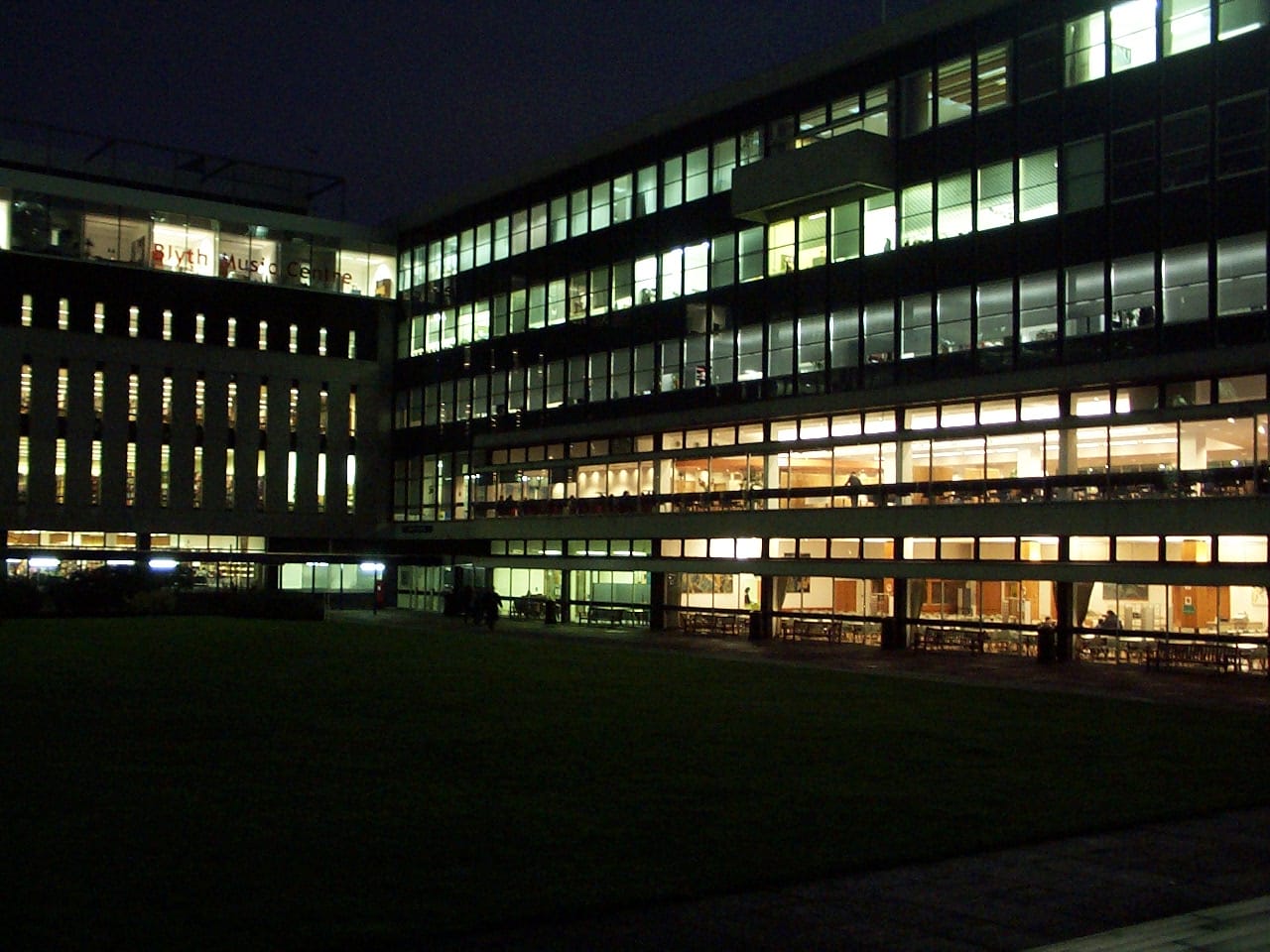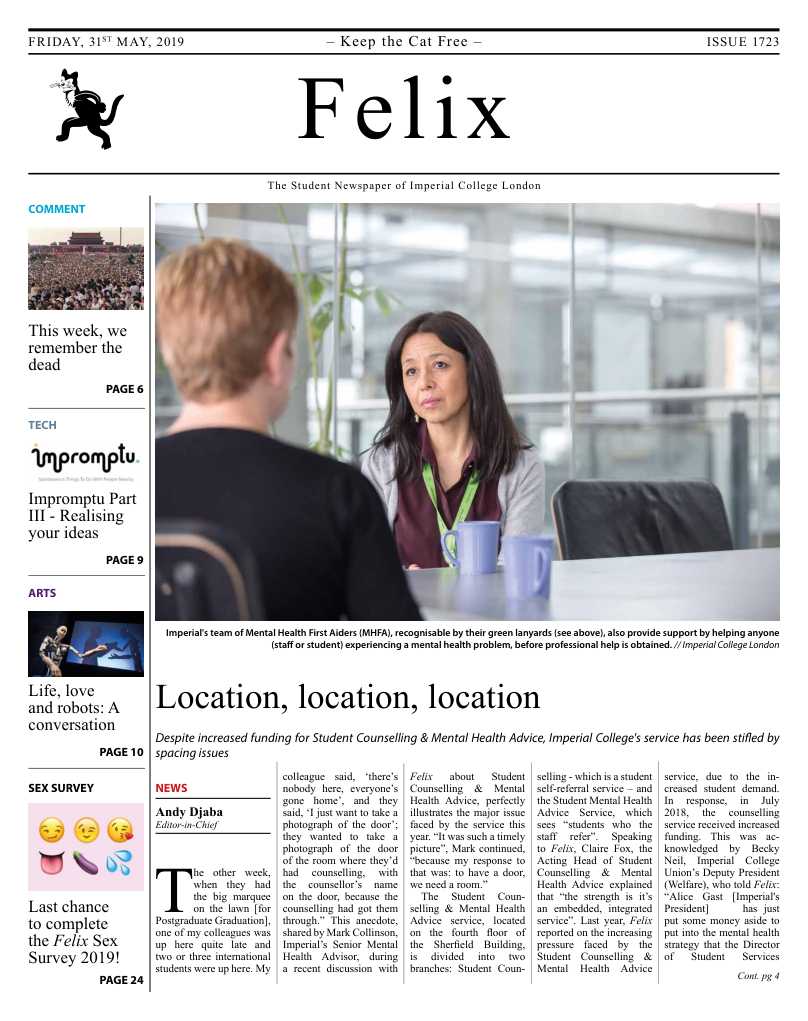Location, location, location
Despite increased funding for Student Counselling & Mental Health Advice, Imperial College's service has been stifled by spacing issues

The other week, when they had the big marquee on the lawn [for Postgraduate Graduation], one of my colleagues was up here quite late and two or three international students were up here. My colleague said, ‘there’s nobody here, everyone’s gone home’, and they said, ‘I just want to take a photograph of the door’; they wanted to take a photograph of the door of the room where they’d had counselling, with the counsellor’s name on the door, because the counselling had got them through.” This anecdote, shared by Mark Collinson, Imperial’s Senior Mental Health Advisor, during a recent discussion with Felix about Student Counselling & Mental Health Advice, perfectly illustrates the major issue faced by the service this year. “It was such a timely picture”, Mark continued, “because my response to that was: to have a door, we need a room.”
The Student Counselling & Mental Health Advice service, located on the fourth floor of the Sherfield Building, is divided into two branches: Student Counselling - which is a student self-referral service – and the Student Mental Health Advice Service, which sees “students who the staff refer”. Speaking to Felix, Claire Fox, the Acting Head of Student Counselling & Mental Health Advice explained that “the strength is it’s an embedded, integrated service”. Last year, Felix reported on the increasing pressure faced by the Student Counselling & Mental Health Advice service, due to the increased student demand. In response, in July 2018, the counselling service received increased funding. This was acknowledged by Becky Neil, Imperial College Union’s Deputy President (Welfare), who told Felix: “Alice Gast [Imperial's President] has just put some money aside to put into the mental health strategy that the Director of Student Services [Hannah Bannister] is planning, so there’s definitely a lot of support from above”. However, this increased financial support for the service has failed to translate to increased support for the students due to the persisting issue of finding increased space on campus for the service.
Claire explained this to Felix, stating: “Last summer, we were allocated in the budget three full-time equivalent counsellors, which is positive; but, consequently, we weren’t given or allocated the space to go with the resource.” Claire went on to describe how the service has attempted to navigate these challenges: “We tried to think creatively and we went ahead and we’ve recruited. We couldn’t recruit for the three full-time because we haven’t got the space. We rented some rooms in SALC [the Seminar and Learning Centre], which aren’t ideal because… they’re meeting rooms. They’ve got meeting room furniture, counsellors up there are constantly interrupted by people just walking into the rooms, and you might have distressed students in there.”
The importance of an adequate, professional space in which both the student and counsellor feel comfortable can’t be overstated, as Claire and Mark stressed to Felix: “Just like a doctor needs a consulting room or a surgeon needs an operating theatre, mental health professionals need a professional space that respects the student in supporting them. It’s about us feeling that we are grounded and can offer that professional support because we’re talking with students about what’s distressing them or what they’re concerned about and you don’t want to be interrupted.” However, the vital importance of such a room is often “misunderstood” because counselling and mental health advice is often seen as “just a chat”. This is vehemently not the case. Speaking specifically about the Mental Health Advisory service, Mark contested: “We offer a skilled conversation with a mental health professional. We refer people on if we need to or we liaise with GPs. I think the main thing we do is try to see people through their time here and offer a check-in.”
The requirements for a professional counselling space include soundproofing, privacy and natural light, as well as somewhere that is consistently available, so students “know the same space or room they’re turning up to”, and somewhere that feels safe for the students that’s not directly in their academic faculty where they can be seen going in or accessing support. Claire explained, “if you’re with a student that’s very distressed or very depressed, being in a basement or a windowless room is not good”.
Claire went on to explain that, when booking rooms, priority is given to the academic schools, especially with meeting rooms. As a result, the choices left available to the Student Counselling & Mental Health service are limited. “I think the difficulty we’ve encountered is each faculty feels it owns its own space… and to break into the wider institution is very difficult”, Mark told Felix. Another difficulty that has presented itself is the fact that, despite the fact that the service is part of Imperial, it needs to “sit a little bit separate”, in order to provide students with some separation from their day-to-day routine.

This spacing issue has effectively left the service down on resourcing, despite being allocated extra resources. As Mark concisely puts it, it’s akin to having “more surgeons but no more operating theatres”. Despite compromising by making use of meeting rooms in SALC in an attempt to “put the students first”, this has done little to improve the situation for a counselling service facing ever increasing footfall. Recent research suggests that there has been a 50% UK-wide increase in student demand for mental health services and Imperial is no exception. Claire told Felix, “we’ve so far seen just over 1300 students – that’s combined with both teams – this academic year." These students are "across all faculties, all departments, all levels, from undergraduate to postdoc to research". This is already an increase on the 1013 students that accessed the Student Counselling and Mental Health Advice service in the 2016/17 academic year and represents alleged 12% and 50% increases in the number of students accessing the Counselling and Mental Health Advice services, respectively, compared to last year. “By the time we get to the end of this academic year, it’s going to be 60% up on last year”, predicts Mark. This increased demand, coupled with the restricted resourcing, has had a predictably detrimental effect on waiting times. Students accessing the Counselling Service will have an initial assessment, following which they will receive counselling, if deemed appropriate. Students then have access to seven counselling sessions for the year in what is referred to as a “brief therapeutic model” – the majority of the students will make use of four of these sessions, which is in line with the national average for universities. Last year, the wait time between initial assessment and counselling was reported to be seven weeks. This year, that is up to eight weeks. The service determines who to see first based on need, ensuring the most vulnerable students are seen the quickest; time spent on the waiting list is also taken into account to prevent those with lower-level problems being left indefinitely. It is also important to note that, if a student discloses risk – which they can do via email or on the online Counselling Referral form – there is a duty counsellor that works to expedite said student’s assessment, if appropriate.
Although the system for the Mental Health Advice service is very different, its similarly disappointing waiting time is also a reflection of the increased student demand and inadequate resourcing. Mark explained to Felix: “Staff often phone us, so we talk to staff about students a lot, often anonymously. We do that continually; there’s obviously no wait for that but, if a student is referred, we always endeavour to see the student within a working week. However we’re not achieving that, we’re just absolutely not. These are quite important referrals; it’s important enough for a student to have gone to their tutor and it’s important enough for the tutor to have been concerned and feeling that they can’t sort it, that it needs someone with some mental health expertise, so they are all quite urgent”. Again, it is important to note that, in this case, if a referral flags up significant distress, there will often be a response within 24 hours.
There are many theories behind why there has been an observed increase in student demand for mental health services, including a reduced stigma around mental health leading to people being more comfortable talking about it. Claire concurs, saying: “Mental health is becoming less of a taboo. It’s being spoken about, it’s in the press, the stigma is greatly diminishing and that’s healthy and that’s how it should be. With the media talking about mental health more, it’s on everybody’s agenda. With that, there’s an increase in demand.” One factor that could also explain the increase observed at Imperial is the introduction of the Counselling service’s online self-referral form. This came in at the start of this academic year and allows students easier and quicker access to the service, leading to an inevitable increase in the number of referrals. Another contributing factor, and perhaps the largest, is the academic pressure and widely perceived competitive culture that exists at Russell Group universities like Imperial. Claire explained: “This College draws a certain type of student that is very gifted or very academically able and talented and, with that, a lot of students want to do well and are used to doing well; that’s part of their identity, it’s part of how they see themselves. When you have a whole cohort of students coming, that are all very gifted and very bright and very driven… you get this culture where there is academic competition and that then creates internally within students a pressure to compete. Sometimes, when that gets a bit distorted, they can become quite self-critical and quite punitive.” Shervin Sabeghi, incoming Deputy President (Welfare) for 2019/20, told Felix: “It’s hard to deny that there is an air of competition but I think it’s more about the way people respond to that”. When the question of whether it is the university’s duty to tackle this culture was put to them, both Claire and Mark agreed that considering it a “dual responsibility” is the “healthy way” to approach the issue. “It should be both the student taking ownership and responsibility for their own mental health and psychological wellbeing and obviously the College has a duty of care as well”, Claire added. “What they are trying to think about is what they are in control of in terms of adding extra pressure. Conversations around when exams are sat, how many should be put into a week, the stuff that the university is in control of”. The example of the College taking measures so as not to exacerbate pre-exam and exam time pressure and stress is particularly pertinent as the Counselling service sees spikes during these periods, often made worse by the exam schedule.
It’s easy to see the issues facing the Student Counselling & Mental Health advice service as a problem which only affects students but, with recent research showing that employees are three times more likely to discuss physical ailments over mental health issues at work, it is important to also highlight the affect that these persisting issues have on staff. Mark explained to Felix: “We’ve got a very experienced, professionally qualified team here with huge amounts of experience in dealing with students’ mental health and hugely experienced counsellors. We’re passionate about what we’re doing, we want to provide the best care and to not be able to do that in a timely way is very frustrating for us; the biggest effect on us is frustration. Our overall feeling is frustration because we can’t quite do what we want to do and what we’re able to do.” This effect has been noticed by students interacting with these staff, particularly those involved in the Union’s Wellbeing Representation Network.
Although the wider issue of how space is managed within College persists, there may have been a recent breakthrough in the provision for the Student Counselling & Mental Health Advice service. According to Claire, Hannah Bannister [Director of Student Services] has been “really endeavouring and working hard to try and find space”. At the time of writing, a potential space on the Hammersmith campus which could be converted into two very small consulting rooms is under site review. If the space is found to be viable, the process will be expedited such that it is made available for 1st August. Question marks still surround the provision of mental health support across campuses, particularly with the College’s expansion into White City, but this development could mark the start of an upturn in fortunes for the counselling service.
Claire ended the discussion with Felix with the following important message: “One of the first things I say to a student when I’m with them in that kind of session is it takes a lot of bravery sometimes to come and sit with a stranger, albeit a mental health professional, a counsellor in a confidential space, it takes some courage. Accessing mental health or counselling support is a sign of strength. It’s a sign of strength because you’re actually prioritising yourself”.







